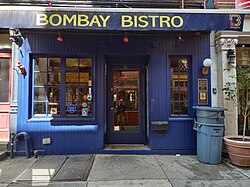 | |
 Interactive map of Caffe Cino | |
| Address | 31 Cornelia St. New York City United States |
|---|---|
| Coordinates | 40°43′52.6″N74°00′10.5″W / 40.731278°N 74.002917°W |
| Operator | Joe Cino |
| Type | Off-Broadway theatre |
| Construction | |
| Opened | 1958 |
| Closed | 1968 |
| Website | |
| caffecino | |
Caffe Cino was an Off-Off-Broadway theater founded in 1958 by Joe Cino. The West Village coffeehouse, located at 31 Cornelia Street, was initially conceived as a venue for poetry, folk music, and visual art exhibitions. The plays produced at the Cino, however, became most prominent, and it is now considered the "birthplace of Off-Off-Broadway". [1]
Contents
- Beginnings and early productions
- Fire and Cino's death
- Notable contributors
- References
- External links
The building was added to the National Register of Historic Places on November 9, 2017. [2]

